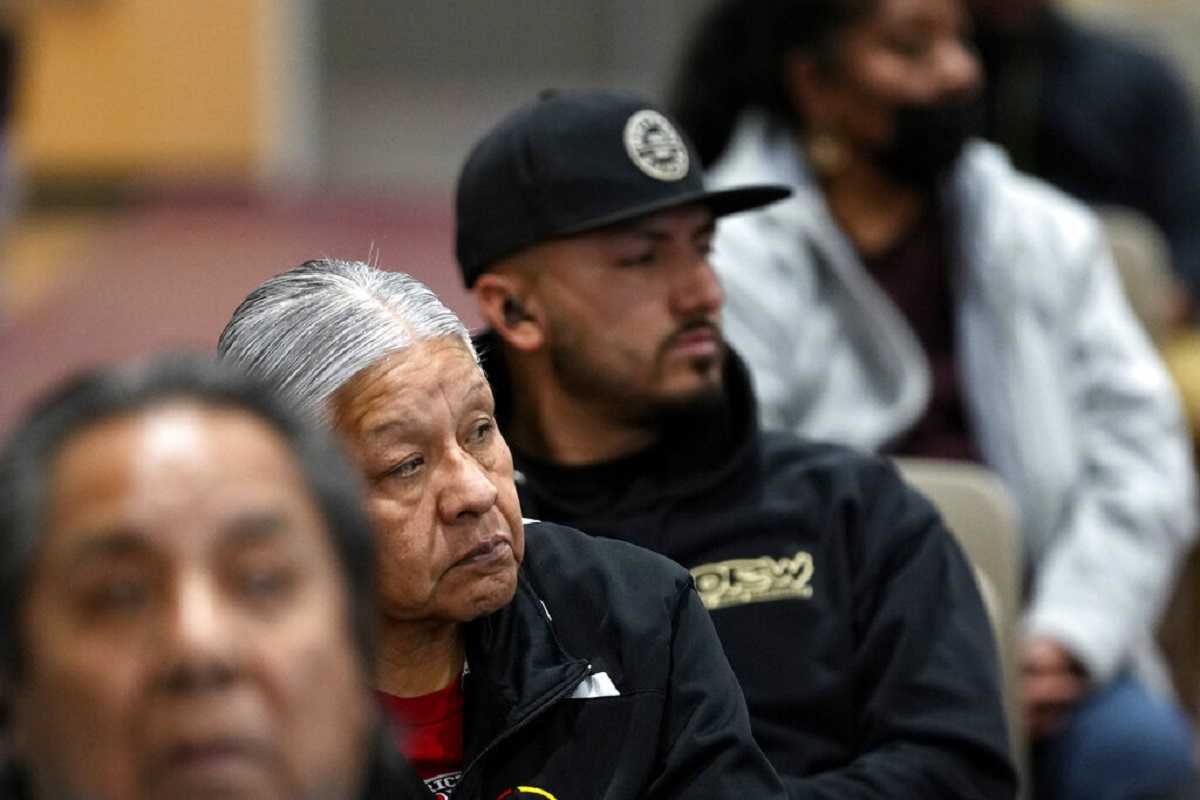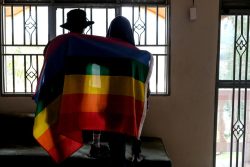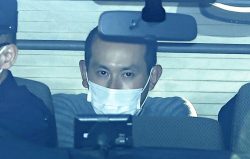
Residents of Gila River Indian Community listen during a “Road to Healing” event, Friday, Jan. 20, 2023, at the Gila Crossing Community School in Laveen, Ariz.
10:56 JST, January 21, 2023
LAVEEN VILLAGE, Ariz. (AP) — During seventh grade at Phoenix Indian School, Pershlie Ami signed up to go on what the school called an “outing” — promoted as opportunities for Native American students to earn spending money off campus.
They were opportunities — for cheap labor.
Ami said most people have no idea that the school staff would send students out to work, often doing menial tasks, for strangers whose backgrounds weren’t checked.
“A family came and picked me up and took me to their home. The task that they wanted me to do was pick up dog poop in their house,” Ami said during a listening session Friday in the Gila River Indian Community just south of Phoenix overseen by U.S. Interior Secretary Deb Haaland.
The session is part of a yearlong “Road to Healing” tour for victims and survivors of abuse at government-backed boarding schools. It is the fourth stop for the nation’s first and only Native American Cabinet secretary after previous stops in South Dakota, Oklahoma and Michigan.
Now 67 and living in nearby Laveen, Ami, who is Hopi, still remembers vehemently refusing to clean the house and the fallout.
“I got severely punished for not doing what that family had asked me to do. I was never allowed to go out on another outing,” she said. “Then I started to wonder what happened to some of these kids that went out on these outings, that nobody ever followed up on them.”
Ami was one of several people who spoke during Haaland’s visit to Arizona before a large audience that included Gov. Katie Hobbs and Democratic Rep. Ruben Gallego.
Several testimonies addressed issues in addition to abuse, such as losing one’s culture and language. The session took place in the multipurpose room of Gila Crossing Community School, where artwork and banners reflected the heritage of the local tribe.
“This is one step among many that we will take to strengthen and rebuild the bonds with the Native communities that federal Indian boarding school policies set out to break,” Haaland said before the session.
Starting with the Indian Civilization Act of 1819, the U.S. enacted laws and policies to establish and support the schools. The stated goal was to “civilize” Native Americans, Alaska Natives and Native Hawaiians, which was often carried out through abusive practices.
In Arizona alone, there were 47 federal Indian boarding schools — and that number does not even include the religious and private institutions received federal funding to run schools.
“My ancestors and many of yours endured the horrors of the Indian boarding school assimilation policies carried out by the same department I now lead,” Haaland said. “This is the first time in history that a United States cabinet secretary comes to the table with a shared trauma. That is not lost on me.”
Haaland has prioritized publicly examining the trauma caused by these schools. In May, the Interior Department released a first-of-its-kind report pointing out 408 schools the federal government supported that stripped Native Americans of their cultures and identities. At least 500 children are known to have died at some of the schools. But when more research is done, that statistic is likely to rise.
A majority of the speakers were descendants of boarding school survivors. They shared how their parents had a hard time learning how to be good parents because they were separated from their own — some at a very young age. Ami, whose father also went to a boarding school, remembered how he would refer to himself as “just a dumb Indian.”
“I think he did eventually get rid of that image of being ‘a dumb Indian,'” Ami said. “But he never stopped using that phrase in reference to himself.”
The vulnerability of victims has spurred tears at all of these sessions. However, Deborah Parker, chief executive of the National Native American Boarding School Healing Coalition and a member of the Tulalip Tribes, said there’s feelings of hope, too.
“There’s a sense of encouragement. Yes, we can finally tell our stories and maybe we can begin to heal,” Parker said. “Those tears help cleanse emotions that we’ve been keeping inside of us for sometimes generations.”
Congress is planning to reintroduce legislation to establish a boarding school “truth and healing commission,” according to Parker. It would be similar to one established in Canada in 2008. If passed, it would have a broader scope than the Interior Department’s investigation into federally run boarding schools and subpoena power.
Meanwhile, a second report is pending in the school investigation launched by Haaland, who is a member of Laguna Pueblo in New Mexico. It will focus on burial sites, the schools’ impact on Indigenous communities and also try to account for federal funds spent on the troubled program.
Top Articles in News Services
-

Survey Shows False Election Info Perceived as True
-

Hong Kong Ex-Publisher Jimmy Lai’s Sentence Raises International Outcry as China Defends It
-

Japan’s Nikkei Stock Average Touches 58,000 as Yen, Jgbs Rally on Election Fallout (UPDATE 1)
-

Japan’s Nikkei Stock Average Falls as US-Iran Tensions Unsettle Investors (UPDATE 1)
-

Trump Names Former Federal Reserve Governor Warsh as the Next Fed Chair, Replacing Powell
JN ACCESS RANKING
-

Producer Behind Pop Group XG Arrested for Cocaine Possession
-

Japan PM Takaichi’s Cabinet Resigns en Masse
-

Man Infected with Measles Reportedly Dined at Restaurant in Tokyo Station
-

Israeli Ambassador to Japan Speaks about Japan’s Role in the Reconstruction of Gaza
-

Videos Plagiarized, Reposted with False Subtitles Claiming ‘Ryukyu Belongs to China’; Anti-China False Information Also Posted in Japan

























